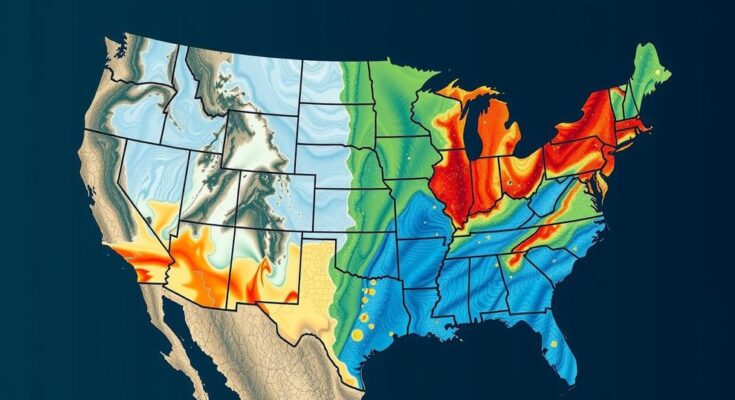American climate policy is entering a critical phase as Donald Trump may return to the presidency in 2024, likely withdrawing from the Paris Agreement again. This history of fluctuating commitments adversely impacts global climate diplomacy, particularly for developing nations that suffer the most from climate change despite minimal contributions to emissions. The article explores the implications of such policy swings and the need for a more stable global climate action framework.
The evolving landscape of American climate policy continues to provoke significant concern on the international stage. Following Donald Trump’s potential return to the presidency in 2024, many anticipate an imminent withdrawal from the Paris Agreement, threatening the fragile global climate consensus. This cyclical trend of U.S. engagement and disengagement with climate initiatives not only undermines climate diplomacy but also exacerbates the existential realities faced by developing nations that bear the brunt of climate change despite contributing minimally to emissions.
The history of American climate policy reflects dramatic shifts, beginning with President Barack Obama’s participation in the Paris Agreement in 2016, signifying a commitment to global climate leadership. However, Trump’s withdrawal from the agreement just a year later, based on economic concerns, disrupted efforts to consolidate global climate goals. With President Joe Biden’s reentry into the accord in 2021, there was hope for the restoration of U.S. credibility in international climate dialogues. Now, however, with the specter of Trump’s return looming, the international community finds itself skeptical and watchful as the past threatens to repeat itself.
For nations of the Global South, this pattern of fluctuating U.S. commitment starkly illustrates a critical disparity in global climate responses. The understanding that climate action for affluent countries can be easily dismissed is acutely felt by countries grappling with the immediate impacts of climate change. In urban centers like Lagos, Jakarta, and rural regions in Honduras and Kenya, the inconsistent American climate policy resonates as an act of betrayal, highlighting the dire need for consistent and binding commitments from developed nations addressing climate change.
Should the United States once again withdraw from the Paris Agreement in 2025, the ramifications for upcoming conferences like COP30 will be profound. Developing nations, already distrustful of Western commitments, would be compelled to adjust their negotiating positions based on a concrete history of unreliability. This situation poses the question of why these nations should accept restrictions on emissions when developed nations can treat their obligations as negotiable.
The argument that ties U.S. withdrawal to economic disadvantage appears less compelling when viewed from the Global South’s perspective. For these nations, the devastating localized effects of climate change are not far-off concerns but present realities that undermine their agricultural sectors and threaten coastal cities. The need for serious climate action becomes increasingly urgent as vulnerable populations face displacement due to climate-induced circumstances.
As the impending shift in American climate policy unfolds, the dynamics of global climate diplomacy may be irreversibly altered. Countries in the Global South are now seeking to establish independent strategies for climate resilience that do not depend on inconsistent backing from developed nations. The growing influence of nations like China in the realms of climate diplomacy further complicates the situation, as developing countries ponder their alliances amid shifting political landscapes.
The critical question that now confronts the international community is how to build robust climate action frameworks that can endure the political fluctuations of influential nations. Strategies focusing on decentralized cooperation, fostering partnerships among cities, regions, and non-state actors, could mitigate the impact of political changes at the national level. By moving climate initiatives forward through local networks, the reliance on national governments may diminish.
Despite this potential pivot towards local action, the core issue remains unaddressed. The original intention of the Paris Agreement revolved around fostering trust and shared responsibility among nations, and the U.S. withdrawal has further destabilized these foundations. With trust in the global climate governance system eroding, the prospect of a unified response to climate challenges becomes increasingly tenuous.
In conclusion, the trajectory of Western climate leadership, particularly that of the United States, is no longer a reliable cornerstone for global climate efforts. The Global South finds itself at a crossroads, navigating existential threats while acknowledging that the path to climate resilience may require looking beyond the fleeting commitments of powerful nations. As climate impacts intensify, the focus now shifts towards establishing an equitable and sustainable approach to climate action that does not hinge solely on the political whims of any one nation.
The topic centers on the volatile nature of American climate policy and its implications for the global climate agenda. It highlights the cycle of engagement and withdrawal exhibited by various U.S. administrations, particularly under Presidents Barack Obama, Donald Trump, and Joe Biden. The article examines the reaction of developing nations, particularly in the Global South, to these fluctuations, emphasizing the stark discrepancies in climate commitment expectations between affluent and poorer nations. It also discusses the potential ramifications of American policy shifts on international climate negotiations and the trust needed for effective global climate governance.
The article underscores the necessity for a shift in climate diplomacy that prioritizes consistent commitments from wealthy nations. The current state of American climate policy is a significant factor contributing to distrust and ineffectiveness in international climate agreements. As developing nations face immediate threats from climate change, the need for reliable global cooperation becomes paramount, signaling the end of reliance on unpredictable Western leadership and the need to forge independent paths towards climate resilience.
Original Source: www.ips-journal.eu




